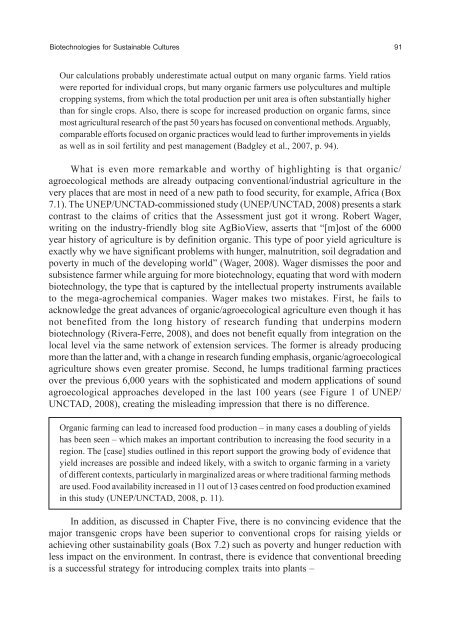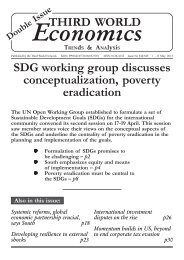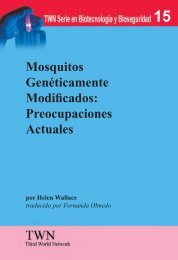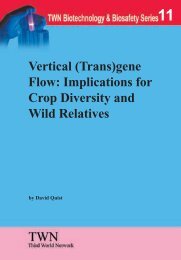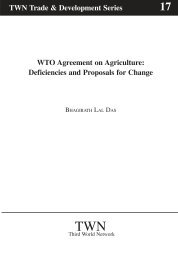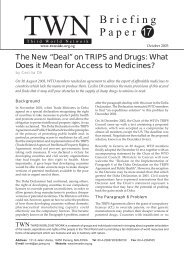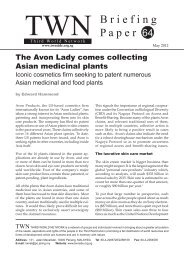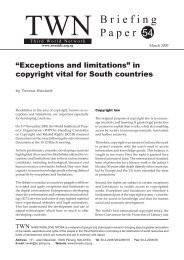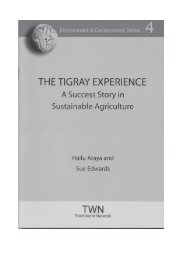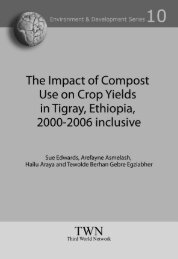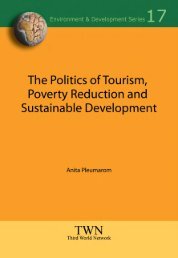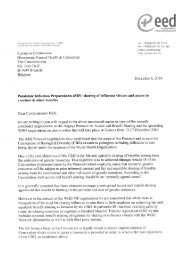Hope Not Hype - Third World Network
Hope Not Hype - Third World Network
Hope Not Hype - Third World Network
- No tags were found...
Create successful ePaper yourself
Turn your PDF publications into a flip-book with our unique Google optimized e-Paper software.
Biotechnologies for Sustainable Cultures<br />
91<br />
Our calculations probably underestimate actual output on many organic farms. Yield ratios<br />
were reported for individual crops, but many organic farmers use polycultures and multiple<br />
cropping systems, from which the total production per unit area is often substantially higher<br />
than for single crops. Also, there is scope for increased production on organic farms, since<br />
most agricultural research of the past 50 years has focused on conventional methods. Arguably,<br />
comparable efforts focused on organic practices would lead to further improvements in yields<br />
as well as in soil fertility and pest management (Badgley et al., 2007, p. 94).<br />
What is even more remarkable and worthy of highlighting is that organic/<br />
agroecological methods are already outpacing conventional/industrial agriculture in the<br />
very places that are most in need of a new path to food security, for example, Africa (Box<br />
7.1). The UNEP/UNCTAD-commissioned study (UNEP/UNCTAD, 2008) presents a stark<br />
contrast to the claims of critics that the Assessment just got it wrong. Robert Wager,<br />
writing on the industry-friendly blog site AgBioView, asserts that “[m]ost of the 6000<br />
year history of agriculture is by definition organic. This type of poor yield agriculture is<br />
exactly why we have significant problems with hunger, malnutrition, soil degradation and<br />
poverty in much of the developing world” (Wager, 2008). Wager dismisses the poor and<br />
subsistence farmer while arguing for more biotechnology, equating that word with modern<br />
biotechnology, the type that is captured by the intellectual property instruments available<br />
to the mega-agrochemical companies. Wager makes two mistakes. First, he fails to<br />
acknowledge the great advances of organic/agroecological agriculture even though it has<br />
not benefited from the long history of research funding that underpins modern<br />
biotechnology (Rivera-Ferre, 2008), and does not benefit equally from integration on the<br />
local level via the same network of extension services. The former is already producing<br />
more than the latter and, with a change in research funding emphasis, organic/agroecological<br />
agriculture shows even greater promise. Second, he lumps traditional farming practices<br />
over the previous 6,000 years with the sophisticated and modern applications of sound<br />
agroecological approaches developed in the last 100 years (see Figure 1 of UNEP/<br />
UNCTAD, 2008), creating the misleading impression that there is no difference.<br />
Organic farming can lead to increased food production – in many cases a doubling of yields<br />
has been seen – which makes an important contribution to increasing the food security in a<br />
region. The [case] studies outlined in this report support the growing body of evidence that<br />
yield increases are possible and indeed likely, with a switch to organic farming in a variety<br />
of different contexts, particularly in marginalized areas or where traditional farming methods<br />
are used. Food availability increased in 11 out of 13 cases centred on food production examined<br />
in this study (UNEP/UNCTAD, 2008, p. 11).<br />
In addition, as discussed in Chapter Five, there is no convincing evidence that the<br />
major transgenic crops have been superior to conventional crops for raising yields or<br />
achieving other sustainability goals (Box 7.2) such as poverty and hunger reduction with<br />
less impact on the environment. In contrast, there is evidence that conventional breeding<br />
is a successful strategy for introducing complex traits into plants –


